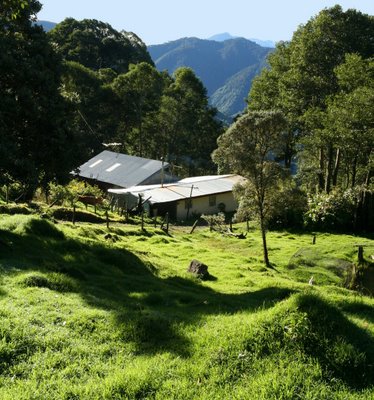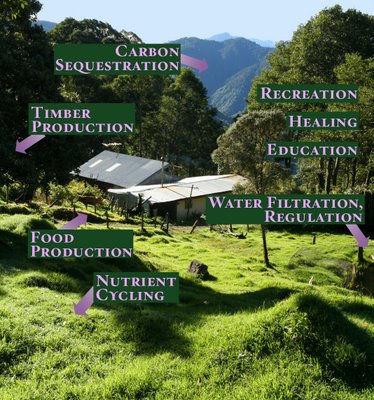The Case for Conservation Information Systems
As promised, I'm beginning a series of posts based on components of my master's research. I'll begin by answering this basic question: why should anyone care? That is, why would we in conservation who have so few dollars to address the enormous need we face spend any money or even time on information systems?
Here's my answer: The game is changing. Conservation of natural systems has moved from a personal value to a requirement for living. Our historical focus on species loss and sprawl must broaden dramatically to include issues as complex and integrated as climate change, water. The Nature Conservancy's marketing department is already on the job: "Last great places" has been replaced by "Protecting nature. Preserving life." On the information side of the house, the conservation comunity must recognize and respond to the need for a new level of scientifically rigorous, defensable information to guide, improve and account for our actions.
Environmental conservation has always had to answer the question, what and how do we conserve? After all, limited resources and compelling alternatives are nothing new. But the more sophisticated answers mean higher demands on information.
Conservation 1.0. In its early form, human conservation of natual systems has focused on the protection of beautiful, "wild" places and the species that compell us. The criteria for conservation was thus subjective, even intuitive. Who needs an information systems for that? We see it, we love it, we protect it. Simple. Protecting a place is straightforward. Protecting a species usually means protecting habitat. So we'll need good ecology and habitat maps. Not so simple, but usally doable given that clear focus.

Conservation 2.0. We've known for a while now that the sixth great extinction is underway, anthropogneic in origin. Translation: massive critter die off, our fault. The Endangered Species Act moved us beyond the "charasmatic" critieria and instead asked questions about species' rarity. Now we're studying a lot more ecology and mapping a lot more habitat in the context of government accountability for the recovery of nature's rare elements. Then E.O. Wilson coined the term “biodiversity” as we recognized the need to preserve the full bounty of nature's creatures and habitats and conservation took up the charge. With more sophisticated analyses of critical species habitat, richness, rarity or irreplacibility we identified "hot spots" that gave us big biodiversity bang for our buck. Uh oh. We might need some serious information systems to help us understand a whole slew of species habitats and their conditions. Who has this data, how do we get it, integrate it (so easy to say, so hard to do), and analyze it?
Conservation 3.0. Present day. By necessity, the conservation agenda must respond to at least five new realities, all with significant ramifications for our information systems requirements:
- People really do need nature
Awareness of the human dependency on functioning natural systems is on the rise and with it the need to explicitly value the services provided by intact, functioning natural systems. This view recognizes conservation’s role in informing tradeoffs in the ongoing human domestication of nature. Valuation of ecosystem services depends on highly quantitative, spatially-explicit, multi-scaled analyses based on both biophysical and socioeconomic datasets.
- Global Climate Change
Suddently, effective conservation depends on forcasting nature's response to a changing climate. Tall freckin' order! We must develop models of biodiversity response to changing conditions at a scale that can inform natural resource management and landscape planning. These analyses themselves must accomodated improvements in prediction algorithms and the granularity and accuracy of input datasets. - No more “go it alone”
Both assessments and action increasingly require of conservation organizations deep collaborations with each other, partners in government and the private sector. To effect decision making, assessments across the spectrum of conservation subjects, from the condition of individual species to integrated regional land-use planning, increasingly require contributions from multiple organizations and disciplines. Similarly, implementation of conservation projects more and more often involves active participation of cooperating organizations. Effective collaboration depends on information sharing and integration. - Scale Matters
Conservation biology increasingly recognizes that the geographic scale at which analyses are performed changes the questions asked and answered. As a result, multi-scale assessments are required to effectively inform decision making within a given region. - Account and Adapt
Finally, the business of conservation is under increased pressure from the donors and the public to account for its spending and objectively measure outcomes of its strategies. Adaptive management specifically requires that we do no “wait for science;” rather measure and respond to measurement of our actions themselves.
All of the changes above translate to growing, not shrinking, demands on effective information systems. Conservation must adapt to the changes underway in its core business. The era of intuitive valuation of conservation priorities has ended. Donors and societies must know that their investments in conservation are based on rigorous and informed analysis. We may not be particularly good at this stuff today, but we better get good at it and quick. We risk fidelity to our mission as well as relevancy to society if we do not invest in the information systems capacity required to protect nature and preserve life.
Labels: Conservation IT, Ecoinformatics, Healthy Planet


1 Comments:
Kristin,
You say:
Both assessments and action increasingly require of conservation organizations deep collaborations with each other, partners in government and the private sector.
I'd like to point out that social networking technology makes meaningful action by individuals possible by aggregating it. I work for a company that was founded on the idea of allowing individuals to both assess and take action on climate change (admittedly only one part of the conservation equation); see a blog post on our early attempts here: http://www.readwriteweb.com/archives/brighter_planet.php.
Looking forward to reading more. Best,
Seamus
PS. You've got a blog, why not sign up for our 350 Challenge? http://350.brighterplanet.com
Post a Comment Hide comments